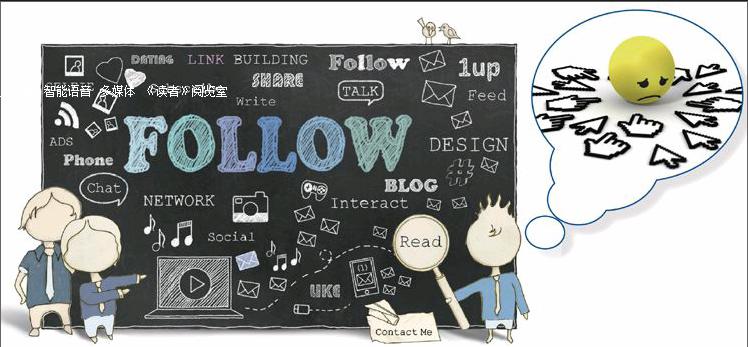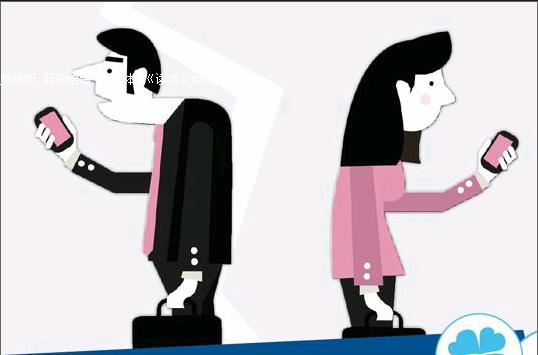网络时代,分手也难
2014-12-05文/CallieSchweitzer
文/Callie+Schweitzer+译/Lily



The most serious relationship of my life so far ended last summer without a trace—physically at least. There was no ceremonious “return of the stuff” because there was nothing to return. No boxes of photos and trinkets1), no mix tapes, nothing.
There was, however, an extensive virtual trail: thousands of IMs2), texts, tweets, Facebook pictures and Instagram posts. And thats a lot harder to get rid of than a toothbrush. Love might die, but its digital counterpart never does. Theres just no way to completely scrub3) your digital self from a relationship in 2014, no quick way to sever4) digital ties once theyve been formed and no easy way to tell your social media networks that youre no longer together.
Of course you can untag pictures and break up on Facebook, but for those whove shared a lot, the digital impression of couplehood remains very much alive. That presence has been established so publicly that theres no way to maintain an “out of this relationship” message proclaiming, “In case you missed it, we are broken up!”
For people who live online like I do, the very lifecycle of a breakup has been redefined. Its not enough to put someone out of your mind—you must allow for others to notice the slow fade of that persons presence on your feeds. Eventually theres the hushed question: “Did you guys break up? I noticed hes not in any of your pictures anymore.” People almost sound ashamed to have noticed, but perhaps its the sharers who are ashamed for having documented the love affair so completely and publicly in the first place.
Our social media trails are an incredibly intimate digital diary that we allow the entire world to click through. So its not surprising that for many of us dating has become performance art, and both our closest friends and our most casual acquaintances have a front row seat. This is particularly true for millennials like me whove grown up with the idea of having an audience of friends and supporters and expecting instant and constant feedback—whether its coming from our mother or a person we once knew at summer camp. Its part of our DNA. But its hard not to wonder whether that craving for approval from all those far-flung5) friends is changing the way we bond and interact with the people we love.
Weve all grown accustomed to seeing others chronicle their personal milestones like proposals, marriage and babies. What would have been a private moment 15 years ago is now a public achievement as well. And the rewards are tangible: Facebook is engineered to elicit6) an emotional high, but the constant comparisons make us sadder, less satisfied and more sensitized to the lives of others. “Fear of missing out”—once reserved for the party pictures we knew would come if we stayed home on a Saturday night—has progressed to a gut7) concern over the life stage we think we should have reached based on what our high school and college friends are sharing on Facebook.
It is in this hothouse of competition that we create a second, vibrant form of ourselves online. We cultivate the image of a happy couple or simply a very happy person with many friends. Every day we declare who we are with a simple retweet or post. Every day we curate8) our digital personas9). And yet its incomplete. No one captures their tiffs10) or disagreements and boasts about them on social media—we keep those skeletons11) in our virtual closets. We become “Facebook official” as evidence of couplehood, and yet, the mere act of changing that status can feel so painful: a public proclamation of something that no longer exists. (Why does Facebook give you 12 options for changing your relationship status and only one way to like something?)
And while the public-facing relationship, documented day after day, might have looked perfect, a breakup forces us to reconcile our public selves with the private heartbreak. All the tweeting and texting and posting communication stops and the performance meets reality. All of the supportive likes and “you look so happy together” comments start to feel empty. And the ego-boosting affirmation that came with them turns to a uniquely public form of embarrassment. In fact, some of the moments we regret most on Facebook involve the “emotional” content tied to dating and relationships. Watching our Facebook “Look Back” videos is a reminder of just how much weve chronicled12), and maybe some memories we “might not want to actually remember.” It wont be long before we have a presidential candidate whose high school Facebook photos are held against13) him or her.
But perhaps theres already a backlash14) to this kind of performance underway with the rising popularity of anonymity apps like Whisper and Secret or the disappearing documentation of apps like Snapchat.
And while I often preach the importance of online authenticity15), Im left questioning what the digital age can and cannot capture, and what we are even trying to capture in the first place. So much of life is too complicated and messy and complex to be portrayed publicly, and relationships certainly fall into that category. I wonder if it is the braver and bolder decision to hold on to our privacy.
去年夏天,我生命中迄今为止最当真的一段感情不留痕迹地结束了——至少现实中如此。没有出现仪式性的“归还物品”情节,因为根本无物可还。没有一盒盒的照片和小玩意儿,没有自编的混音带,什么都没有。
然而,我们却留下了大量的虚拟痕迹:成千上万的即时讯息、短信、推文、Facebook上的照片和Instagram中的发帖。除掉这些比扔掉一个牙刷困难多了。爱情也许会消亡,但是它对应的数字形式却永远不会。你根本无法将数字化的自己从2014年的恋爱关系中完全抹去,无法迅速切断业已形成的数字化纽带,也无法云淡风轻地在你的社交媒体网络中宣布你们已经不在一起了。
当然,你可以撤除照片的标签,在Facebook上分手,但是对那些分享过很多东西的人而言,情侣身份在网络上给人留下的印象仍旧栩栩如生。这种印象已经在公众面前如此根深蒂固,以至于你根本没法维持“这段感情已结束”的信息,并宣布:“怕你们不知道说一声哈,我们分手了!”
对于像我一样生活在网络中的人来说,分手所特有的生命周期已经被重新定义了。将某人从你的心里移除是不够的——你必须让他人也注意到那个人已逐渐淡出你发布的帖子。最后,他们会悄声问:“你俩分手了吗?我发现你发的所有照片里都不再有他的身影了。”听上去人们几乎都为注意到这件事觉得难为情了,但也许感到难为情的是那些发布者,因为是他们首先那么完整地公开记录了恋爱的点滴。
我们在社交媒体中留下的痕迹是极为私密的数字化日记,允许全世界点击浏览。因此不足为奇的是,对我们许多人来说,约会已变成一种表演艺术,无论是我们最亲密的好友还是最随意的泛泛之交都可以在前排就座观看。对于像我一样的“千禧一代”来说,情况尤为如此。我们在成长过程中抱有一种想法:朋友和捧场的人是我们的观众,我们期待即时和连续不断的反馈——无论这反馈来自妈妈还是夏令营中曾结识的某个人。这是我们与生俱来的特质。但人们难免怀疑,这种渴望得到所有那些远方朋友赞赏的心态是否正在改变我们与所爱的人相处和互动的方式。
我们都变得习惯于见证他人记录个人生活中里程碑式的事件,比如求婚、结婚、生子。15年前被视为隐私的时刻如今也成了一种公开的成就。回报是切实有形的:Facebook的设计旨在引起情感高涨,但不断的攀比却让我们更加难过,更加不满足,对他人的生活也更加敏感。“错失恐惧”原来专门用于描述我们周六晚上待在家里的话看到别人聚会照片时的心态(我们知道这种照片会纷至沓来),现在却已发展为一种来自心底的担忧,担心自己未达到我们自认为本该达到的人生阶段。对于这一阶段的判断则基于我们的高中和大学同学在Facebook上分享了什么。
正是在这个竞争的温床中,我们在网络上创造了另一个活力四射的自己。我们树立起一对幸福情侣的形象,或仅仅是一个好友成群的非常幸福之人的形象。每一天,我们都通过简单的转发或发帖宣告着自己是谁。每一天,我们都精挑细选地展示着自己数字化的表面形象。然而这并不是全部。没有人会在社交媒体上描述自己的争执或分歧并就此夸耀——我们将那些丑事关在了虚拟的壁橱里。我们把Facebook上的感情状态作为情侣关系的证明,但仅仅改变这种状态就会让人很痛苦:这是公开宣布某些东西已不复存在。(为什么Facebook提供了12种改变感情状态的选项,却只有一种方法来表达喜欢?)
这种日复一日记录下来的面向公众的感情也许曾经看起来完美,但一旦分手,我们就要被迫调和自己的公众形象与内心伤痛之间的矛盾。所有的推文、短信和发帖交流都戛然而止,作秀遭遇了现实。所有表示支持的“赞”和“你们看起来真幸福”之类的评论都开始让人感觉空洞。而随“赞”和评论而来的那些让人自我膨胀的肯定都转化成一种独有的公开的尴尬。事实上,我们在Facebook上感到最后悔的某些时刻就包括发布那些与约会和恋爱有关的“感情”内容。观看Facebook上的“回顾”视频可以提醒我们曾记录了多少内容,或许某些回忆我们“可能并不想真的记住”。过不了多久,就会有某个总统候选人会因为其高中时代在Facebook上发布的照片而备受责备。
但也许对这种作秀行为的抵制已经慢慢出现,匿名应用软件如“私语”和“秘密”越来越受欢迎,Snapchat之类应用软件的“阅后即焚”功能也越来越受欢迎。
虽然我经常宣扬网络信息的真实性多么重要,却也开始思考数字化时代中能够和不能获取的信息是什么,以及我们原本试图获取的是什么。生活中有很多东西都太晦涩、凌乱、复杂,我们无法将其公开演绎,情侣关系当然就包括在内。我想知道,是否坚守个人隐私才是更加勇敢无畏的决定。
1. trinket [?tr??k?t] n. 小装饰物;小玩意儿
2. IM:即时讯息,instant message的缩略
3. scrub [skr?b] vt. 擦掉,刷掉
4. sever [?sev?(r)] vt. 断绝,中断
5. far-flung:遥远的
6. elicit [??l?s?t] vt. 引起
7. gut [ɡ?t] adj. (感情等)发自内心深处的;直觉的
8. curate [?kj??re?t] vt. 从众多可能的事物中挑选以供他人欣赏
9. persona [p?(r)?s??n?] n. (同本人真实品格不一的)表面形象
10. tiff [t?f] n. (夫妻或朋友间无关紧要的)争执,口角
11. skeleton [?skel?t(?)n] n. (不可外扬的)丑事
12. chronicle [?kr?n?k(?)l] vt. 记录,记载
13. hold against:因……而责怪
14. backlash [?b?k?l??] n. 强烈反应;强烈抵制
15. authenticity [???θen?t?s?ti] n. 可靠性;真实性
